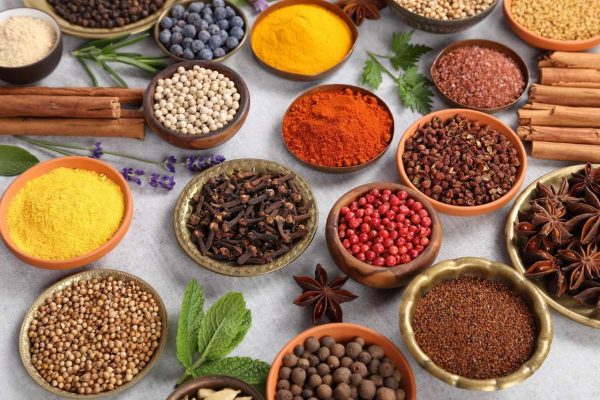Tired of the same salt-and-pepper taste of your veggies and other meals and ready to turn over a new leaf in your cooking journey? Here are some herbs and spices to give a new kick to your cuisine!
Crushed red pepper
For those who like things a little on the warm side, a little sprinkle of crushed red pepper is a must. Very popular in classic pizza joints, the pepper is made up of dried and crushed-up red chilis. If you like a little more heat, find a variety with the seeds still in!
It’s very versatile, and you can add it to anything you feel needs a bit of spicing up.
Crushed red pepper is rich in antioxidants (like carotenoids) that give your body a chance to fight cell damage.
Garlic powder
If you love to cook Italian, you probably already have some garlic powder in your cabinet. Whether you’re adding it to spaghetti or using it in a delicious marinade, garlic cannot help but make any dish more flavorful and interesting.
What you might not know is that garlic powder, consumed regularly, can help lower your cholesterol and lower your risk of high blood pressure. This doesn’t mean go crazy on the garlic bread—it’s also very important to consider what you’re eating the garlic on.
Oregano
The other spice most known for pairing well with pizza and chilis, oregano is a member of the mint family, though it tastes nothing like it. It’s best to curb your enthusiasm when you use oregano in a dish, because its strong, savory flavor can with ease overtake the flavor of other herbs or even the dish itself.
Oregano has many health benefits. It contains iron, fiber, vitamin E, calcium, and other important nutrients.
Cumin
Cumin is a member of the parsley family, but it packs quite a heftier flavor punch. It has a strong scent often associated with taco seasoning and other Mexican or Tex-Mex dishes, most likely because the taste is able to give the flavor of heat without adding too much spiciness for those who don’t appreciate it.
Cumin contains many important vitamins like vitamin E, niacin, and vitamin B6, as well as countless minerals necessary to a healthy life like calcium, iron, magnesium, potassium, and zinc.
Cayenne
Cayenne pepper is about 10 times hotter than a jalapeño pepper. It is definitely not for the spice-sensitive tongue. However, for those who like a fiery dining experience, cayenne is the spice for you.
This super spice has seemingly endless, diverse uses, both culinary and medicinal. It can be used as an aid for digestion, a boost for your immune system, an appetite stimulant, and many more benefits for your overall health. When applied to the skin, it can even minimize scar tissue!
Basil
This herb is one of the most commonly used in a variety of dishes, from simple egg dishes to complex Italian cuisine, or even a salad. Though a cousin of oregano in the mint family tree, its taste is much milder and sweeter, and it can be used in greater quantities.
Basil contains vitamins A, K, and C, iron, calcium, and magnesium. It has a huge variety of medicinal uses as well, such as stress relief (from the scent), nausea relief, and helping to detoxify the liver.
Turmeric
If you’ve ever used any sort of traditional medicine, you probably have taken turmeric at some point in your life. With a slight gingery, bitter taste, turmeric adds a bright pop of color and health benefits to your dishes.
It’s one of nature’s best remedies. It can ease joint pain and stiffness, help prevent some cancer cell growth, help balance blood sugar, and help protect your digestive system, among numerous other benefits.
Ginger
Ginger, the famous root, is likely the number-one choice in home remedies. It has a very unique taste that some describe as peppery, but has the unusual property of being a delicious addition to both savory and sweet dishes.
Everyone knows about the anti-nausea effects a can of ginger ale can have, but that’s not all ginger can do. It also aids digestion and acts as an anti-inflammatory. Along with other treatment, ginger can help reduce cholesterol and lower the risk of blood clots.
Rosemary
Another cousin in the mint family tree, rosemary is one of the most fragrant, distinctive herbs you can find. With a sweet, strong flavor many describe as something between pine and lemon, rosemary can be used in anything from barbecue recipes to desserts to teas.
In the summer months, it can be a great insect repellent. Many use it as an essential oil to help relieve stress, cold symptoms, and menstrual cramps. In its dried herbal form, it is often considered a memory aid. It can help cure dandruff and prevent hair loss as well.
Thyme
Often paired with rosemary to achieve a warm yet fragrant peppery taste, thyme is one of the most important staples of a well-rounded spice cabinet. Its lack of strong scent and flavor makes it a great herb to compliment other, stronger herbs.
Thyme, like many of these other herbs and spices, contains iron, vitamin A, and vitamin C, along with other nutrients important for a healthy body. It can help reduce stress, headaches, and hair loss, along with helping to treat kidney problems, insomnia, and some types of nail fungi.
Make your grocery list!
These herbs and spices, both when dried or fresh, add not only new, interesting flavors to your cooking, but also have overall health benefits. Andy Yurechko, registered dietitian with Augusta University Health, says that “spices can be used in place of salt altogether. Check out certain spice mixes (Italian seasonings, or steak/chicken rubs, etc.) which contain multiple herb blends together—find ones that do not contain salt. Cajun spice blends, for example, typically have tons of salt. Watch out for garlic salt and onion salt. These contain plenty of salt too!” He also recommends staying away from the pill forms of these herbs and spices, like garlic and cinnamon pills.
There are also many spices not covered here that you can use in baked goods, like nutmeg, cloves, and cinnamon. “Cinnamon, for example, can help insulin resistance.”
It’s also very important to know that many of the spices listed here are not sufficient sources of vitamins and nutrients on their own. Yurechko comments, “Some of these herbs are sources of vitamins, minerals, and/or fiber—however, you have to use a lot of the stuff to get a benefit. For example – an orange has a ton of vitamin C. A spice may have a decent amount, but you may need to consume a cup of spice to get the same benefit.” The vitamins and minerals in these spices can be used as additional sources, but you shouldn’t rely on them.
Don’t be afraid to experiment with combinations of these herbs and spices. You might discover something new!





